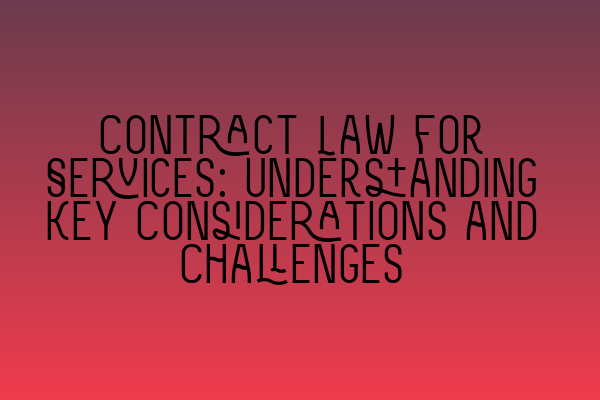Contract Law for Services: Understanding Key Considerations and Challenges
Welcome to the SQE Contract Law blog! In this post, we will delve into the intricacies of contract law for services. Whether you are a solicitor, business owner, or simply curious about the legal aspects of service agreements, this article will provide you with valuable insights to navigate this complex area of law.
Before we delve into the key considerations and challenges, let’s first establish a common understanding of what contract law for services encompasses. In simple terms, it governs the legal relationship between parties involved in providing or receiving services. This can range from professional services such as legal advice or consulting, to construction work, IT services, and beyond.
Now, let’s explore the key factors that necessitate careful consideration when drafting and negotiating service contracts.
1. Clearly Define the Scope of Services:
When entering into a service agreement, it is crucial to clearly define the scope of services to be provided. This includes specifying the nature, quality, and quantity of the services, as well as any relevant deadlines. Clearly outlining these details helps avoid misunderstandings and disputes down the line. Interpreting Contractual Clauses: Unlocking the Hidden Meanings is a great resource to better understand the nuances of contract clauses.
2. Thoroughly Outline Payment Terms:
The terms governing payment are of utmost importance in service contracts. Parties must agree on the price, payment schedule, and any additional costs or penalties. Ensuring clarity on these matters helps avoid payment disputes and protect the interests of both service providers and recipients.
3. Address Intellectual Property Rights:
Intellectual property considerations are often relevant in service contracts, particularly in industries such as technology, creative arts, and research. Parties must define who owns the intellectual property rights to any work created under the contract and how they can be used. Agreements in Contract Law: Understanding Its Various Types provides further insights into the different types of agreements that can be used in contracts.
4. Include Provisions for Termination:
Service contracts should include clear provisions outlining the circumstances and procedures for termination. This provides parties with an understanding of their rights and obligations in the event that one party wishes to terminate the contract. Additionally, it is essential to consider the modes and consequences of contract discharge, as explored in Discharge of Contracts: Modes and Consequences Explained.
5. Consider Liability and Indemnity:
Liability and indemnity clauses determine the extent to which one party will be held responsible for any damages or losses incurred by the other. These clauses are crucial in service contracts, particularly when it comes to professional negligence claims. Such considerations help protect both service providers and recipients from potential legal risks.
As you can see, contract law for services encompasses several key considerations that must be addressed to ensure the smooth functioning of business relationships. Careful drafting and negotiation of service contracts can help mitigate potential risks and provide a solid legal foundation for the provision of services.
At SQE Contract Law, we understand that contract law can be a challenging subject to grasp. That’s why we offer Contract Law Tutorials: Simplifying Complex Concepts for Students, which can provide a comprehensive overview of contract law principles.
In conclusion, mastering contract law for services requires a deep understanding of key considerations and the ability to navigate potential challenges. By clearly defining the scope of services, establishing transparent payment terms, addressing intellectual property rights, including termination provisions, and considering liability and indemnity, parties can create robust service contracts.
If you have any further questions or need assistance with contract law matters, do not hesitate to reach out to SQE Contract Law. We are here to provide expert legal advice and support to help you navigate the complexities of this area of law.
Stay tuned to our blog for more informative articles on various aspects of contract law!
